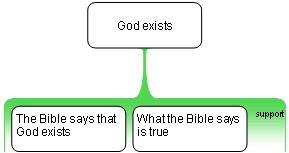
A false dilemma, also referred to as false dichotomy or false binary, is an informal fallacy based on a premise that erroneously limits what options are available. The source of the fallacy lies not in an invalid form of inference but in a false premise. This premise has the form of a disjunctive claim: it asserts that one among a number of alternatives must be true. This disjunction is problematic because it oversimplifies the choice by excluding viable alternatives, presenting the viewer with only two absolute choices when in fact, there could be many.
In logic and deductive reasoning, an argument is sound if it is both valid in form and its premises are true. Soundness has a related meaning in mathematical logic, wherein a formal system of logic is sound if and only if every well-formed formula that can be proven in the system is logically valid with respect to the logical semantics of the system.
In classical rhetoric and logic, begging the question or assuming the conclusion is an informal fallacy that occurs when an argument's premises assume the truth of the conclusion. Historically, begging the question refers to a fault in a dialectical argument in which the speaker assumes some premise that has not been demonstrated to be true. In modern usage it has come to refer to an argument in which the premises assume the conclusion without supporting it. This makes it more or less synonymous with circular reasoning.

A syllogism is a kind of logical argument that applies deductive reasoning to arrive at a conclusion based on two propositions that are asserted or assumed to be true.
A fallacy, also known as paralogia in modern psychology, is the use of invalid or otherwise faulty reasoning in the construction of an argument that may appear to be well-reasoned if unnoticed. The term was introduced in the Western intellectual tradition by the Aristotelian De Sophisticis Elenchis.
Deductive reasoning is the mental process of drawing deductive inferences. An inference is deductively valid if its conclusion follows logically from its premises, i.e. it is impossible for the premises to be true and the conclusion to be false.
Denying the antecedent, sometimes also called inverse error or fallacy of the inverse, is a formal fallacy of inferring the inverse from an original statement. It is a type of mixed hypothetical syllogism in the form:
Inductive reasoning is a method of reasoning in which a general principle is derived from a body of observations. It consists of making broad generalizations based on specific observations. Inductive reasoning is distinct from deductive reasoning, where the conclusion of a deductive argument is certain given the premises are correct; in contrast, the truth of the conclusion of an inductive argument is probable, based upon the evidence given.

Logical reasoning is a mental activity that aims to arrive at a conclusion in a rigorous way. It happens in the form of inferences or arguments by starting from a set of premises and reasoning to a conclusion supported by these premises. The premises and the conclusion are propositions, i.e. true or false claims about what is the case. Together, they form an argument. Logical reasoning is norm-governed in the sense that it aims to formulate correct arguments that any rational person would find convincing. The main discipline studying logical reasoning is called logic.
The fallacy of four terms is the formal fallacy that occurs when a syllogism has four terms rather than the requisite three, rendering it invalid.
A false premise is an incorrect proposition that forms the basis of an argument or syllogism. Since the premise is not correct, the conclusion drawn may be in error. However, the logical validity of an argument is a function of its internal consistency, not the truth value of its premises.
Informal fallacies are a type of incorrect argument in natural language. The source of the error is not just due to the form of the argument, as is the case for formal fallacies, but can also be due to their content and context. Fallacies, despite being incorrect, usually appear to be correct and thereby can seduce people into accepting and using them. These misleading appearances are often connected to various aspects of natural language, such as ambiguous or vague expressions, or the assumption of implicit premises instead of making them explicit.
In logic and philosophy, a formal fallacy, deductive fallacy, logical fallacy or non sequitur is a pattern of reasoning rendered invalid by a flaw in its logical structure that can neatly be expressed in a standard logic system, for example propositional logic. It is defined as a deductive argument that is invalid. The argument itself could have true premises, but still have a false conclusion. Thus, a formal fallacy is a fallacy where deduction goes wrong, and is no longer a logical process. This may not affect the truth of the conclusion, since validity and truth are separate in formal logic.
A premise or premiss is a proposition—a true or false declarative statement— an argument to prove the truth of another proposition called the conclusion. Arguments consist of a set of premises and a conclusion.
In argumentation, an objection is a reason arguing against a premise, argument, or conclusion. Definitions of objection vary in whether an objection is always an argument or may include other moves such as questioning.
Imperative logic is the field of logic concerned with imperatives. In contrast to declaratives, it is not clear whether imperatives denote propositions or more generally what role truth and falsity play in their semantics. Thus, there is almost no consensus on any aspect of imperative logic.
The paradoxes of material implication are a group of true formulae involving material conditionals whose translations into natural language are intuitively false when the conditional is translated as "if ... then ...". A material conditional formula is true unless is true and is false. If natural language conditionals were understood in the same way, that would mean that the sentence "If the Nazis had won World War Two, everybody would be happy" is vacuously true. Given that such problematic consequences follow from a seemingly correct assumption about logic, they are called paradoxes. They demonstrate a mismatch between classical logic and robust intuitions about meaning and reasoning.
An argument is a series of sentences, statements or propositions some of which are called premises and one is the conclusion. The purpose of an argument is to give reasons for one's conclusion via justification, explanation, and/or persuasion.
In logic, specifically in deductive reasoning, an argument is valid if and only if it takes a form that makes it impossible for the premises to be true and the conclusion nevertheless to be false. It is not required for a valid argument to have premises that are actually true, but to have premises that, if they were true, would guarantee the truth of the argument's conclusion. Valid arguments must be clearly expressed by means of sentences called well-formed formulas.
Philosophy of logic is the area of philosophy that studies the scope and nature of logic. It investigates the philosophical problems raised by logic, such as the presuppositions often implicitly at work in theories of logic and in their application. This involves questions about how logic is to be defined and how different logical systems are connected to each other. It includes the study of the nature of the fundamental concepts used by logic and the relation of logic to other disciplines. According to a common characterization, philosophical logic is the part of the philosophy of logic that studies the application of logical methods to philosophical problems, often in the form of extended logical systems like modal logic. But other theorists draw the distinction between the philosophy of logic and philosophical logic differently or not at all. Metalogic is closely related to the philosophy of logic as the discipline investigating the properties of formal logical systems, like consistency and completeness.



